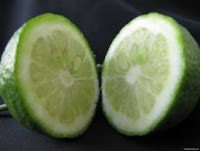The lime fruit comes from Citrus acida not the lime or linden tree which we use as a tisane, lime flower tea. It is a member of the Rutaceae family and so is related to all the other citrus fruits, the lemon, grapefruit, Seville orange, sweet orange, bergamot orange, pommelo, kinnow mandarin and so on.
It is a small tree growing to about 8 feet tall with spines, so you have to be careful when picking limes. It is native to Asia but is cultivated in the West Indies and Italy Italy
 Lime juice is used in
Lime juice is used in In the Indian subcontinent lime oil is used for skin problems, including for removing dandruff from the scalp, and it is believed to be the most beneficial of fruits with sour juices. The juice or fruit is used to promote appetite and to aid digestion as well as to ease constipation, help the liver to function and to stop vomiting. (That, I know works.) It is also thought to be a blood purifier, so is good for skin eruptions, and for the heart.
 If you are bitten by a mosquito and have a lime to hand, the juice will stop the irritation, although you shouldn’t use too much lime juice (everything in moderation) as it can induce photosensitivity. The juice mixed with gur (rock candy or jaggery) is said to be good if you have an enlarged spleen.
If you are bitten by a mosquito and have a lime to hand, the juice will stop the irritation, although you shouldn’t use too much lime juice (everything in moderation) as it can induce photosensitivity. The juice mixed with gur (rock candy or jaggery) is said to be good if you have an enlarged spleen. In Ayurvedic medicine the fruit is used to boost mental faculties, so used to help prevent the loss of memory as people age, and to strengthen the body tissues. It is also given as a tonic for the heart as well as for skin problems and gout.
In other medicine systems it is used for cancerous tumours, skin problems, such as to smooth the skin after the scabs of chicken pox and so on have fallen off, and to alleviate itching, as well as for sore throats as a gargle with or without honey.
It is an antidote to castor oil and croton oil poisoning (for example too much jamalgota, Croton tiglium) and has antioxidant and anti microbial properties as does the lemon.
As for the history of the lime in Western literature, Sir Thomas Herbert mentions it in his book “Travels” as he found it growing close to Mozambique in the mid-1600s along with “oranges and lemons” and William Bartram in his travel book published in 1773 states that Henry Laurens of Charleston, South Carolina, introduced “olives, limes, ginger, ever-bearing strawberry, red raspberry and blue grapes” into the American colonies after 1755.
You can use the lime instead of lemon juice in most recipes but it does impart a different flavour to dishes. Of course it’s good in cocktails too especially mojitas.
SOUTH AMERICAN CEVICHE
1 lb. (½ kilo) white fish fillets, cut into one or two inch pieces
1 medium onion, thinly sliced
juice of 3 fresh limes
juice of 3 fresh lemons
3 cloves garlic finely chopped
salt and freshly ground black pepper to taste
½ tsp cayenne pepper (or according to taste)
1 or 2 hot green or red chilli peppers, thinly sliced
2 tbsps. fresh parsley, shredded finely
2 tbsps. fresh coriander, shredded finely
Method
Put the pieces of fish into a shallow dish in one layer.
Place the onion on top of the fish pieces.
Add all the other ingredients except the juices, scattered evenly over the fish.
Pour the juices over the fish and put the dish in the fridge for at least 4 hours. (You can marinate it overnight if you like.)
This has Taste and is a Treat.





No comments:
Post a Comment